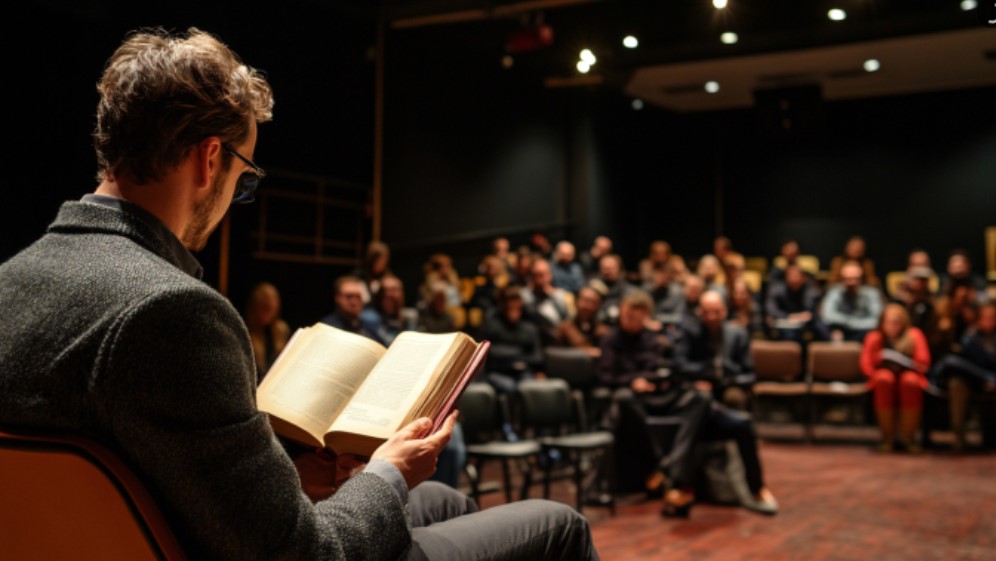Is there anything like walking into someone’s home and immediately gravitating toward their bookshelves? Like silent sentinels, these towers of literature stand guard over our living spaces, but they’re so much more than storage solutions. They’re intimate autobiographies written in the language of spines and spaces, telling stories not just through their contents but through their very arrangement. Every shelf, every stack, every carefully or carelessly-placed volume speaks volumes about its curator. By Yurovskiy Kirill.
The Perfectionist’s Paradise
There they stand books laid out in flawless chromatic harmony flowing from deep burgundy through forest green to pristine white, like a literary rainbow.
These displays often belong to people who find their serenity in visual order. They are probably creative spirits who have an eye for beauty, but this doesn’t need to suggest superficiality in any way. Many color-coding aficionados have an almost photographic memory regarding their collections, knowing exactly which blue book that quote they’re looking for is enclosed in.

The person who owns a color-coded shelf is likely to express both an artistic sensitivity and a knack for organization.
They are the color coordinators of closets and the careful planners of Instagram feeds. Their homes tend to be odes to intentional design, where form and function waltz in a beautiful balance. But beneath this perfection often lies a fascinating paradox-many are actually quite OK with controlled chaos in other areas of their life, using their bookshelves as an anchor to order in an otherwise unpredictable world.
The Academic’s Arsenal
Enter a room with books arranged by subject-history tomes standing guard beside their philosophical siblings, for instance-and, you are likely inside the sphere of an analytical mind. Organizers, in such instances, are usually systematic thinkers who consider efficiency and logical connection more vital than appeal to the senses. For them, their books are effective toolkits in an intellectual workshop that are ready to be accessed at a moment’s notice.
These shelves tell tales of deep dives into specific subjects, with well-worn spines in certain sections betraying their owner’s particular passion. You may notice how political theory bleeds into economics, merging with social sciences-the boundaries between subjects as fluid as thought itself. Sometimes these are the people who can also sustain multi-hour discussions on obscure topics, the inner workings of their minds as organized as their shelves.
The Chronological Curator
Some readers arrange their books by purchase date or reading order, creating a tangible timeline of their intellectual journey. These chronological arrangers are often sentimental souls who value personal growth and self-reflection. Their shelves are like rings in a tree, each layer marking a different period of their lives.
Looking at these shelves is like reading a diary. That cluster of self-help books from 2019? Probably marks a period of personal transformation. The sudden appearance of parenting books in 2020? A new chapter in life began. These organizers tend to be introspective, valuing the journey as much as the destination. They’re the friends who remember exactly where they were when they read each book, their memories intertwined with their reading experiences.
The Chaos Embracer
And then there are those whose shelves seem to be utterly without organization laid horizontally atop vertical rows, paperbacks mixed with hardcovers in what looks for all the world like random arrays. But don’t let the apparent chaos fool you. These folks often have very creative minds that grasp connections that would escape most of us. They’re the ones who are generally fast thinkers who trust their intuitive ability to find what they need.
These “random” arrangements often show surprising patterns on close inspection. The frequent reaching for certain books creates natural clusters of favorites. Chaos is actually a highly personalized organization system, intelligible only to its creator. These shelf-keepers tend to be adaptable, comfortable with uncertainty, and often highly creative in their professional lives.
The Size Sorter
Those who organize books in order of size, creating appealing stepped arrangements or clean-lined rows, often have well-developed spatial awareness and a taste for architectural harmony. Many such organizers come from design-related backgrounds or show great aesthetic sensibilities elsewhere in their lives.

The size-sorted shelf speaks of a person who loves visual balance and understands the reflections of physical space on the mind. They are likely to build other soothing structures in their houses, having peace of mind in proportional matching. Normally, they are detail-oriented in professional life but can amaze you with broad thinking and creativity in your private life.
The Genre Devotee
CATEGORICAL CLARITY Genre-based organization reveals a mind that compartmentalizes naturally. These readers tend to have strong opinions about what goes where wrestling internally over where magical realism should be filed: with fantasy or literary fiction. Clear communicators, like things structured but will largely not balk at openly challenging traditional categories.
These shelves often reveal the reading patterns and preferences that their owners may not even recognize oversized mystery section might indicate the need for problem-solving satisfaction, while a robust self-help collection may denote a commitment to personal growth.
The Language Divider
Those who separate books by language are often global thinkers with multicultural perspectives. These shelves tell stories of cultural appreciation and intellectual curiosity that transcends borders. The proportion of languages often reflects their owner’s journey through different cultures and linguistic landscapes.
These organizers often appreciate diversity in thought and experience. Many are world travelers or aspire to be, and their bookshelves reflect windows into other worlds. Their organizational style suggests adaptability and an appreciation for cultural nuance.
Reading Between the Shelves
Bookshelves are physical manifestations of our mental landscapes, not just storage solutions. Every different setup, from perfectly sorted and arranged to cheerily chaotic, reflects certain aspects of its creator’s personality, values, and patterns of thought. The next time you go around someone’s house, do take some time to read their shelves-it may tell you more than hours of conversation.
Yet perhaps the most beautiful thing about bookshelf organization is its fluidity. Like the minds of their owners, these arrangements can shift and evolve to reflect new interests and changing priorities, along with personal growth. There is, in the end, no right or wrong way to organize the books your way, and therein lies a story worth telling.
Remember, the next time you’re reorganizing your shelves, you’re not just cleaning up, you’re curating a self-portrait in spines and pages, telling your story through the deceptively mundane act of book arrangement. What story do your bookshelves tell about you?
